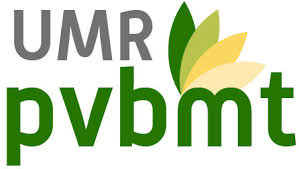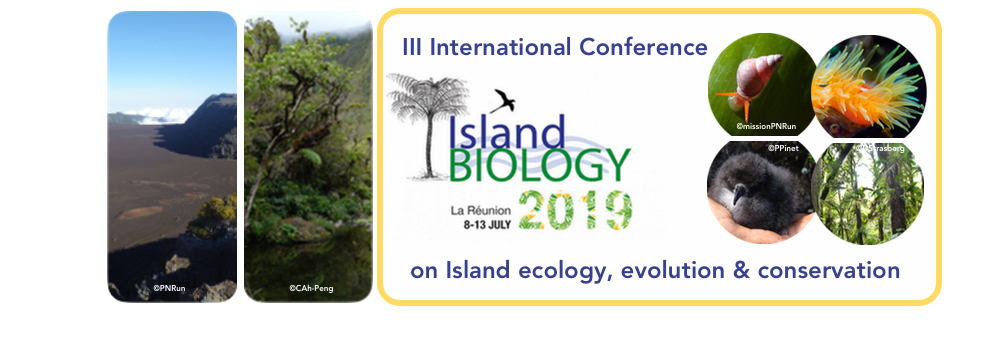Chairs :
- Dominique STRASBERG (dominique.strasberg@univ-reunion.fr)
- Claudine AH-PENG (claudine.ahpeng@univ-reunion.fr)
Scientific Committee :
- Dr. Ah-Peng Claudine, University of La Réunion, France
- Dr. Baider Claudia, Herbarium of Mauritius Min. Agric. Mauritius
- Pr. Becker Nathalie, Museum National d'Histoire Naturelle, France
- Dr. Borges Paulo, University of Azores, Portugal
- Dr. Chabanet Pascale, IRD Réunion, France
- Pr. Drake Don, University of Hawaii, USA
- Pr. Fernandez-Palacios José Maria, University of La Laguna, Spain
- Dr. Florens Vincent, University of Mauritius, Mauritius
- Dr. Flores Olivier, University of La Réunion, France
- Dr. Goodman Steven, Field Museum, Madagascar
- Dr. Lagabrielle Erwann, Universtity of La Réunion, France
- Pr. Lecorre Matthieu, University of La Réunion, France
- Dr. Lequette Benoit, National Park of La Réunion, France
- Dr. Marteau Cédric, Terres Australes et Antarctiques Françaises, France
- Dr. Martos Florent, Museum National d'Histoire Naturelle, France
- Dr. Meyer Jean-Yves, Gouvernement de Polynésie Française, France
- Dr. Radjassegarane Soudjata, La Région Réunion, France
- Dr. Rouget Mathieu, CIRAD, France
- Pr. Strasberg Dominique, University of La Réunion, France
- Dr. Valente Luis, Leibniz Institute for Evolution and Biodiversity Science, Germany
_________________________________________________
Host institution
:

The University of Réunion Island is a French public higher education and research institution, located in the heart of the Indian Ocean, one of Europe's outermost regions. By virtue of its unique geostrategic position it is the only European university in the region.
12 000 students are admitted every year at six sites in St Denis, Le Tampon and Saint Pierre. The university is composed of 961 staff members.
The University of Réunion Island offers a whole range of full-time and vocational multi-disciplinary and diversified curricula:
- European standard-compliant LMD (Bachelor, Master, PhD) degrees in three fields "Arts & Social Sciences", "Law, Economics and Management", "Science, Technology & Health";
- job-oriented courses (vocational Bachelor's degree, undergraduate technology degrees, etc.) in widely different fields such as Civil Engineering, Air Conditioning, Banking & Insurance or Networks & Telecommunications;
- engineering degrees in three domains "Innovation & Integrated Agri-Food Development", "Telecommunication, Computer and Multimedia Services", "Sustainable Construction & Environment".
The University of Reunion Island is composed of 5 Faculties, 3 Institutes, 1 Engineering School, 1 Teacher Training School, 1 Observatory of the Sciences of the Universe, 1 Training Centre and 1 Language Centre. The university hosts 21 research labs including the UMR PVBMT.
_________________________________________________
Our research lab: UMR PVBMT

The UMR PVBMT “Unité mixte de recherches Peuplements végétaux et Bioagresseurs en Milieu tropical”, was created in 2003 and is composed of three teams:
- Genomics and epidemiology of emergent pathogen agents
- Diversity and sustainability of plant genetic resources in tropical systems
- Ecological dynamics in island systems
The research lab counts 73 researchers and technicians. The lab is based at the Plant Protection Pole in Saint-Pierre, this platform specializes in research on plants in support to biodiversity and plant health studies.
For more information: https://umr-pvbmt.cirad.fr
_________________________________________________
Society for Island Biology :
The society for Island Biology is the international society for island biologists. Island Biology stands for the ecology, evolution, conservation, biogeography, macroecology, and paleoecology of all types of islands in the ocean and involving all groups of organisms. It also encompasses the interface of terrestrial and marine ecosystems, and is based on a thorough understanding of geophysical factors.
The Island Biology conference is organized on behalf of the society for Island Biology. Previous conferences were held:In Hawai’i (2014), In Azores (2016).




